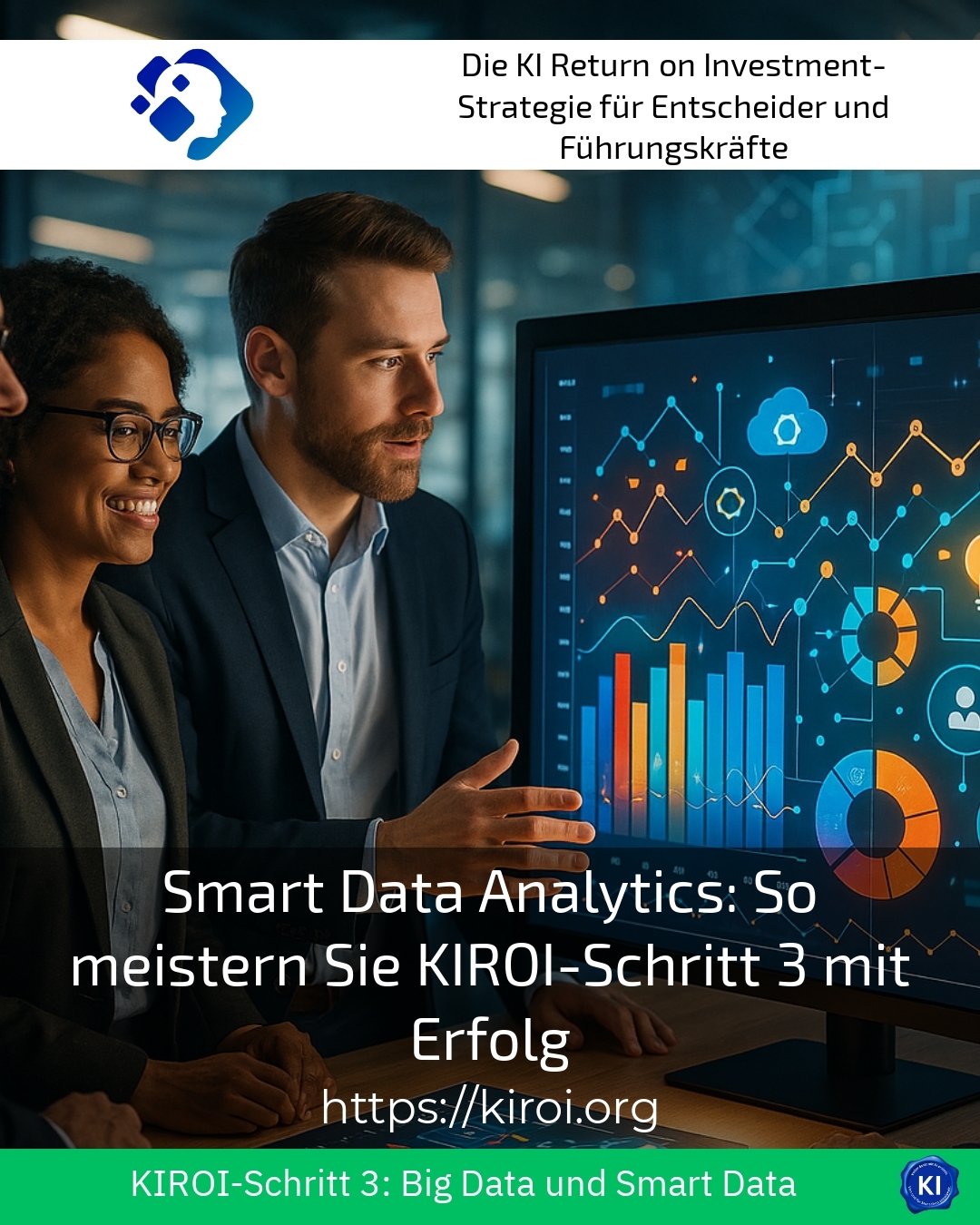Smart data analytics plays a central role for companies that want to operate successfully in a data-driven world. This approach helps to analyse large volumes of data in a targeted manner and gain valuable insights for well-founded decisions. In step 3 of the KIROI process, it becomes particularly clear how smart data analytics can provide valuable impetus when implementing projects.
Smart data analytics as the key to data-based success strategies
Companies from the industrial, retail and service sectors use smart data analytics to convert complex floods of data into usable information. Automated processes and intelligent algorithms help to reduce errors and react promptly to relevant developments. Manufacturers in the production environment can use sensor data to recognise deviations such as irregular material thicknesses or machine vibrations at an early stage and plan preventive maintenance. This predictive maintenance optimises processes and increases system availability.
In retail, digital analyses support marketing by identifying customer segments based on their purchasing behaviour. This enables companies to develop targeted campaigns and better serve customer needs. Pricing is also becoming smarter: predictive models are used to develop optimal pricing strategies that can be dynamically adapted to market conditions. Insurance companies use smart data analytics to efficiently evaluate customer potential and prioritise their sales activities.
In building management, smart analytics helps to increase energy efficiency. Sensors provide data on room utilisation, which is then used for optimal planning. Predictive analyses also enable early maintenance measures, which reduces downtime and cuts costs. Facility managers thus realise a sustainable and ecological mode of operation.
Smart data analytics in KIROI step 3: Providing impetus and support
The third step in the KIROI framework addresses the practical implementation of data-based initiatives. The aim here is to use smart data analytics to select the right data and integrate its analysis into project processes in a meaningful way. Experienced coaches support companies to ensure that decisions are made in a comprehensible and targeted manner. For example, sales teams can be prioritised by using scoring models to identify and target potential new customers.
Smart data analytics is also being introduced step-by-step in production: A pilot project at an automotive manufacturer, for example, showed how material usage could be optimised by analysing press shop data. After successful testing, the solutions were implemented in series production, resulting in a sustainable increase in efficiency.
In practice, many managers report that support from transruption coaches helps them to overcome challenges when dealing with large amounts of data. This support creates clarity when prioritising measures and promotes a data-based corporate culture.
BEST PRACTICE with one customer (name hidden due to NDA contract) The introduction of smart data analytics in a medium-sized production company resulted in data from various departments being automatically merged and visualised in a dashboard. This enabled managers to recognise bottlenecks immediately and initiate measures, which significantly improved delivery times and increased customer satisfaction.
Tips for the successful use of smart data analytics
1. select purpose-specific data: Focus on data that offers real added value and answers specific questions.
2. ensure data quality: Clean and structure data regularly to increase its reliability and informative value.
3. start pilots: Test new analysis methods in small, manageable projects first.
4. qualify teams: Train employees in the use of smart data analytics to strengthen acceptance and application.
5 Use external support: Bring in experienced experts to accompany your project step by step and provide sound input.
Smart data analytics as a trailblazer for sustainable corporate success
The ability to collect and analyse data intelligently and derive specific courses of action from it is becoming increasingly important for companies. Smart data analytics helps to successfully master the third step in the KIROI model by focussing on relevant information and supporting data-based decisions. Whether in production, marketing or building management - the targeted use of smart data analytics helps to optimise processes, make better use of resources and secure competitive advantages.
Through practical examples and accompanying advice, many companies are experiencing how smart data analytics acts as a catalyst and helps to overcome challenges. This approach therefore represents an important building block for data-driven transformation.
My analysis
Smart data analytics offers a wide range of opportunities to effectively implement data-based projects. KIROI step 3 demonstrates the importance of systematically selecting and analysing data that provides concrete insights. Sustainable success results from the combination of technical intelligence and human support. Companies that follow this path can improve their decision-making processes and strengthen their market position.
Further links from the text above:
Smart data: How companies make better decisions [1]
Focus on data analytics: definition, examples and strategic advantages [2]
What is smart data? Definition, application and advantages [3]
Smart data analytics: clever use of data from production [8]
Making decisions with smart data [5]
For more information and if you have any questions, please contact Contact us or read more blog posts on the topic Artificial intelligence here.















